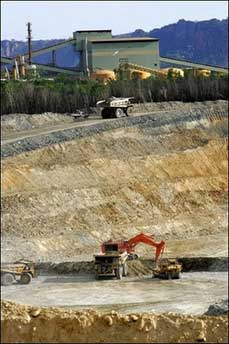Australia could export uranium to China within months
(AFP)
Updated: 2006-09-05 11:00

Australia could start exporting uranium to China within months and
expects to corner about a third of the market for Beijing's giant nuclear
power programme. [AFP/file] | Australia could start exporting uranium to China within months and expects to
corner about a third of the market for Beijing's giant nuclear power programme,
a senior official said.
Australia could earn some US$187 million a year from the deal once it is
ratified, Australian Safeguards and Non-Proliferation Office director-general
John Carlson told a Senate committee.
The committee is looking into treaties covering the export of the nuclear
material signed earlier this year after Canberra said it had secured safeguards
from Beijing ensuring that the fuel would not be used in weapons.
"In principle, we could have uranium going into China in the first half of
next year, but that's speculative," Carlson said.
"But no material can actually be transferred into China until the agreements
are in place. We hope that that will all be in place by the end of the year.
"How quickly uranium then transfers into China really depends on commercial
arrangements and whether the uranium bought will be processed in other countries
before going into China."
China has announced plans to build 28 new nuclear reactors and by 2020 the
annual uranium requirement would be about 8,000 tonnes a year, almost as big as
Australia's current uranium output, Carlson said.
Australia, which has the world's largest known reserves of the nuclear fuel,
could hope to provide about one-third of that, he said.
"That would be a reasonable expectation for us to be exporting to China,"
Carlson said.
There would be no direct Australian involvement in inspections of China's
nuclear facilities and stores as that was up to the International Atomic Energy
Agency, he said.
|